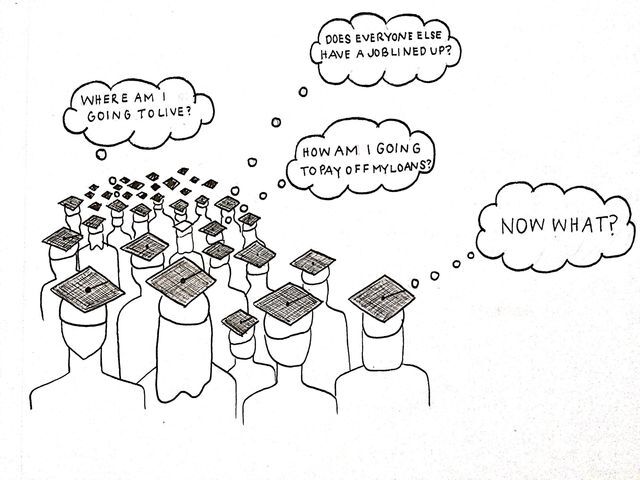The stress students feel as their graduation dates approach is a common sentiment among university students. Not only are students abruptly spit out into the “real world,” but they are also stripped from their bubbles of comfort. Friends and loved ones that students met in school may move away or head back home, which can leave students in a very vulnerable headspace as well.
The next step for students after getting their degree is usually the search for a career or job, but earning a college degree does not always guarantee employment. This is just another source of stress students face in the wake of graduating from secondary education institutions. In fact, sometimes earning a degree leads students to experience a type of trauma accurately called Post-Graduation Stress Disorder/Anxiety.
Students who struggle with this disorder may have a hard time growing accustomed to their new world post-graduation. Although they are free from the stresses of college, such as readings, presentations, exams and deadlines, students can still experience tension after they leave their colleges and universities. This anxiety sometimes only occurs during the adjustment period shortly after graduation, but it can also follow students well into their lifetime.
One of the causes of this anxiety stems largely from the uncertainty of the job market that comes after graduation for some students. Seventy-five percent of candidates for jobs apply online, but only 2 percent of land an interview. Referrals are what gives candidates a better chance at being hired, with 40 percent of referred applicants landing the job. Many students turn to the alumni they find online through websites like LinkedIn; and while advice from alumni is helpful in the job-searching process, it should not be one of the only ways students prepare themselves for post-grad life, and students should not have to find these resources alone.
Texas State does not properly address or inform its students on the very real issue of post-graduation stress disorder. The university does little to help prepare its graduates for life after they leave Texas State, particularly when it comes to the anxieties that graduation causes. Students are required to take several classes that do not fit inside their area of study, but they are not required to take a class prepping them on resumes, applications, where to look for jobs post-graduation or learning how to face the worries that come along after getting a degree. Texas State does not have a program that equips each of its graduating students with a plan for their lives.
Texas State does have career fairs, career services in the Division of Student Affairs, Jobs4Cats, undergraduate academic resources, such as academic advising and tutoring options, and Handshake, a website where companies pair up with Texas State to help students find jobs that are hiring, that aim in helping its students post-grad. However, the fairs only happen once during a short window of time in which students may have classes or work. The other resources center around academia and do not address how to get to the next step after graduation or how to deal with concerns about life after college.
Students are not expecting handouts after graduating. But, when they dedicate their money, time and mental health for a degree from Texas State, then the university needs to make sure every graduate had the opportunity to be adequately prepared for post-grad life presented to them before they graduate. Texas State has students leaving the university with only a piece of paper and no clue what their next step is. The expectation is not to have Texas State hold each graduate’s hand every step of the way in post-grad life, but to provide these hard-working, paying students an easily accessible resource to learn how to begin the rest of their lives.
– Carissa Liz Castillo is an English senior
Categories:
Texas State does not prepare graduates for post-grad anxieties
November 26, 2018
Students are not expecting handouts after graduating. But, when they dedicate their money, time and mental health for a degree from Texas State, then the university needs to make sure every graduate had the opportunity to be adequately prepared for post-grad life presented to them before they graduate.
Illustration by Caroline James
0
Donate to The University Star
Your donation will support the student journalists of Texas State University. Your contribution will allow us to purchase equipment and cover our annual website hosting costs.
More to Discover






